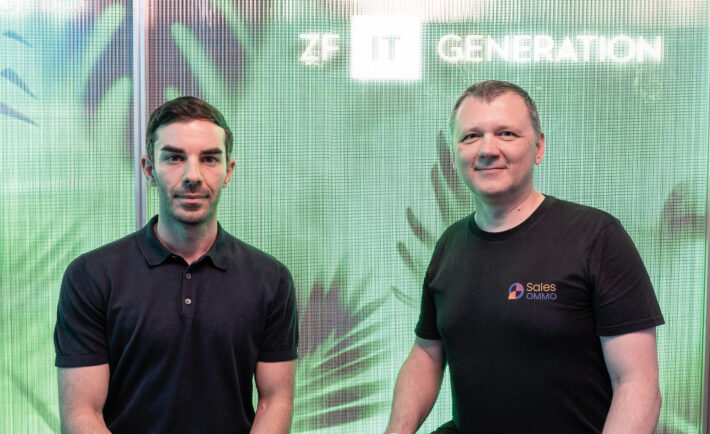Sales Will Still Be About People in 2025 and Beyond

By Mihai Guran, Founder and CEO – SalesOMMO
As we look ahead into 2025, the dynamics within sales departments across industries are visibly shifting. As they do at the beginning of any new planning period, over 88% of sales leaders are engaged in redefining roles and deploying new resources (be it personnel, advanced software tools, or comprehensive training programs) in order to optimize territorial coverage and improve productivity. Marketing budgets and their role in channelling new opportunities remain highly relevant, but there is also something new this year: over 78% of leaders now also focusing on the implications of artificial intelligence (AI) for the industry.
A central question is how AI affects sales departments compared to other sectors. Are AI-driven tools, including cutting-edge AI agents, truly reliable, or do the occasional inaccuracies and hallucinations pose challenges? Identifying roles or tasks where AI can replace or enhance human effort is crucial, as is encouraging user adoption. Furthermore, staying informed about competitor strategies is increasingly important.
Data shows that over 81% of large sales organizations experimented with AI solutions last year; however, only half have fully integrated these innovations. From those who have, many report significant gains: 83% experienced improved outcomes, compared to just 66% among non-AI adopters.
As automation and AI reshape sales tools and processes, these technologies particularly influence areas where direct human interaction is not needed by taking over mundane task, but can also enhance humans with more precision to qualify and target prospects.
Approximately 72% of buyers prefer to independently research online, bypassing sales reps, a trend prevalent for simple, standardized products. In contrast, for complex and innovative solutions, there’s a notable divergence—86% of buyers indicate they would choose differently if companies better understood their business objectives. In such cases AI and automation have limited impact, while establishing a good interpersonal rapport, and earning trust via personalized engagements at human level are the enablers for better decisions.
A majority, 71%, of buyers expect personalized attention, but 59% of them feel people in sales fail to adequately understand their needs. Additionally, 73% perceive interactions as transactional, leading to frustration. The result is often suboptimal sales performance: depending on industry and company specifics, between 67% and 84% of sales professionals fail to meet sales targets.
The flood of information and technological advancements is reshaping sales processes, influencing perceptions and interactions in several distinct ways:
- Information Overload: Both sellers and buyers face overwhelming choices and often struggle to discern trustworthy information.
- Communication Saturation: Buyers encounter relentless automated communication across various channels, and as a result they more and more avoid sales interactions.
- Complexity Challenges: Sales professionals must navigate a plethora of applications and digital tasks, and over 50% of them are feeling overwhelmed by the complexity.
Companies can adopt various strategies responsive to these challenges, tailored to their development stage and resources:
- Role Specialization: Fragment and specialize roles throughout the sales process to encourage focused expertise.
- Increased Outreach: Amplify communication through AI-generated content and automation, despite low success rates.
- Optimize and enhance the quality Interactions: Selectively automate routine tasks to free up cognitive resources of people in sales.
The extra time and capacity that are gained when pursuing an optimization strategy shall be used for more effective, personalized communication, for in-depth analysis of customer information and insights, and to unleash more imagination and creativity in customer approach and deal development.
Large organizations often pursue the first two strategies to enhance productivity by minimizing costly human interactions with clients. They also manage AI-related challenges, such as data privacy, accuracy, and regulatory compliance.
Given that sales professionals spend 60% to 70% of their time on non-client-facing tasks, modern AI solutions aim to increase productivity by reducing time on repetitive, low-creativity activities, such as:
- Contact searching and prospecting
- Meeting preparation and follow-up
- Preparing business or internal materials
- Interfacing with other systems for data extraction and summarization
- Formal management reporting
Small and mid-size firms, offering innovative products but with limited resources, can benefit significantly from a strategy of optimizing client interactions. Many times, their sales and business executives, including founders in key position, cover the entire sales process, from lead generation to closed sales, with relatively lower productivity compared to their colleagues in larger organizations implementing role specialization.
But with AI-powered applications the productivity can rise with 30% up to 40%, offering a competitive advantage by meeting customer demand for personalized interactions, and the possibility to outperform the impersonal automations of larger firms.
AI enables sales teams to harness creativity with higher precision for qualified accounts, streamline communication, run more effective meetings, add value and earn trust in smarter ways, and finally be more efficient. Motivated, well-supported people and teams are statistically more likely to achieve sales targets, presenting a potential two- to threefold increase—a level of success that can rarely be match using only traditional sales tools.
The future is promising for dynamic companies excelling through high-quality offerings, that are also leveraging AI and automation to enhance human-centric client relationships. Their strategic play will be to hire professionals and enable them to act smarter, with higher precision, to be perceived as trusted advisors by clients, matching perfectly the personalization and expert guidance expectations.
Sales, Focus, Personalize, Precision, AI, Insights, Analysis, Smarter, Faster, Relationships, People, Win More



